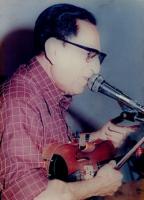 Saleh and Daud Al-Kuwaity
Saleh and Daud Al-Kuwaity
Saleh (1908–1986) and Daud (1910–1976) Al-Kuwaity (Arabic: صالح و داوود الكويتي) were Iraqi-Kuwaiti Jewish musicians. They had a pioneering role in the modern music of Kuwait. The brothers later emigrated from Iraq to Israel.
The brothers were born in Kuwait in 1908 and 1910 to an Iraqi Jewish family. Their father, a Jewish merchant of Persian ancestry, moved to Kuwait from the Iraqi city of Basra. Their family was part of the Kuwaiti Jewish community in the first decade of the twentieth century.
When Saleh was 10 years old, and Daud 8, they received a gift from their uncle who came back from a business trip to India: a violin and an oud.
Saleh began studying music from Khaled Al-Bakar, a Kuwaiti Oud player. He soon began to compose his own music. His first song, "Walla Ajabni Jamalec" (By God, I admire your beauty), is still heard on Gulf radio stations. While still children, the brothers started performing before dignitaries in Kuwait.
Soon enough, Iraqi record companies began recording the brothers and distributing their music throughout the Kingdom of Iraq. Because of Saleh & Daud's success, the Al-Kuwaity family moved back to Basra in Iraq. There Saleh joined the Qanun master Yusuf Zaarur, and learned to compose in the maqamat (plural of maqam- the traditional modes that are basis of Arab music). The brothers started performing in the nightclubs of Basra, and after a while – a result of their growing success – the family moved to Baghdad.
The brothers helped the Jewish community in Iraq, both with material aid for the needy and with influence in the political establishment when necessary, and their being Jews was generally not problematic.[citation needed]
Yet their fortunes changed quickly along with those of Jews in many Arab countries after 1948, with the expansion of the Arab-Israeli conflict and the association of Jews throughout the Arab world with the enemy Israeli state.
In the beginning of the 1950s, facing increasing persecution in Iraq, the al-Kuwaiti family decided to flee the country and join the big wave of emigration to the State of Israel.
Saleh and Daud's status in Iraq was of no use to them when faced with the difficulties of finding their place in Israel. Their welcome in the new country was harsh, and due to a number of factors. First, along with the masses of Jewish refugees from Arab lands, the brothers were sent first to live in a temporary "Ma'abara" in Beer Yaakov, a transit camp with very poor conditions. Later they moved to the poor Hatikva quarter of Tel Aviv, where they would play in the Noah café. Secondly, the dominant ideology of the Israeli state at that time sought to suppress eliminate vestiges of 'diaspora culture', including Yiddish, Sephardi/Ladino, and Judeo-Arabic music. Thus, the mainstream Hebrew-language radio, which at that time was entirely state-owned and wished to promote only Western-sounding music, did not play any Middle Eastern music, even that Jewish performers of Arabic music such as the al-Kuwaiti brothers, their Iraqi contemporary Salima Murad, Salim Halali (an Algerian- and French-Jewish star), Laila Mourad (an Egyptian Jewish singer and actress), or Zohra Al Fassiya (a famous Jewish singer in Morocco).
Despite the prejudice against their music in Israel, Saleh and Daoud found a small outlet for their music on the Arabic network of "The Voice of Israel" shortwave radio service (which broadcast to Arab countries), soon becoming two of its leaders. They performed as guest soloists with the Arabic orchestra of the Israeli Radio led by Zuzu Mussa. For many years the al-Kuwaiti brothers gave a regular live radio performances, with thousands of Arabic speaking people in Israel and millions in Iraq and Kuwait listening. Thanks to the Arabic language shortwave broadcasts of the Israel Broadcasting Authority (which no longer exist), dozens of songs they wrote and composed in Israel also became hits in the Arab world. In fact, despite the constant state of war between Israel and most of the Arab world, the state-controlled radio in Kuwait and Iraq kept on broadcasting their music; however, while earlier generations of Arab listeners had been familiar and comfortable with the brothers and their Jewish identity, Arabic radio after the 1970s, increasingly under the control of nationalist movements such as the Ba'ath Party, began to change this by omitting their name, their Jewish identity, or their Israeli citizenship from credits, causing this history to be forgotten.